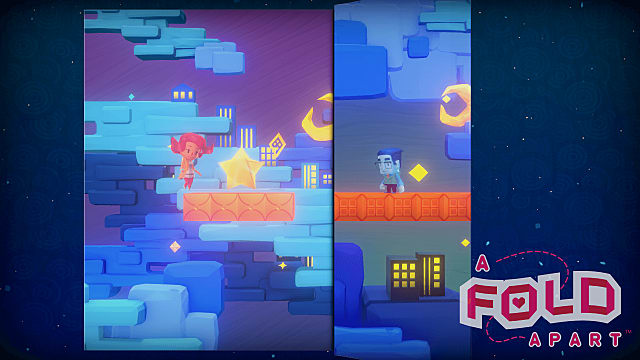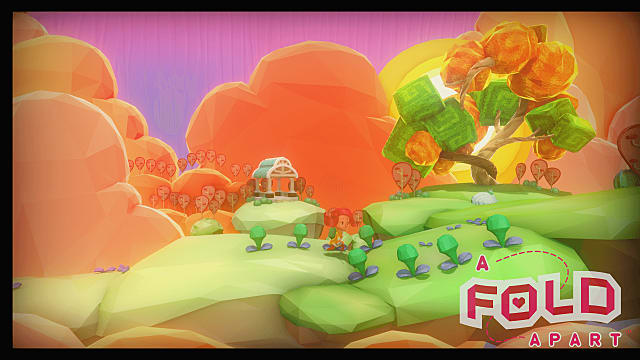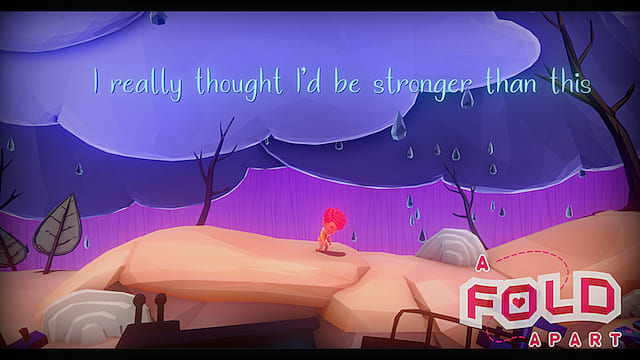With A Fold Apart from indie developer Lightning Rod Games, it all began with a trailer.
With its striking complimentary colors and Pixar aesthetic, the trailer quickly drew me in. It made me laugh and cry in less time than it takes to finish the first several puzzles of the game. A minute, to be exact. I showed the trailer to my wife, and she had a similar reaction, tearing up and reaching over for my hand as we watched.
Fast forward to PAX East in Boston some weeks later, and I was able to finally go hands-on with the game that so quickly captivated me. As soon as I hit “Start,” I wished my wife was right there beside me so we could experience it together.
A Fold Apart, at least in my currently limited experience, is a game brimming with emotion, which makes sense considering its spirited genesis.
According to Co-Founder Mark Laframboise, who led me through the first five puzzles of the game at PAX East, AFA is “a game about long-distance relationships in a world of folding paper,” where thousands of miles can feel like millions.
Coming up with how to translate that feeling of hopeful detachment into a video game didn’t come immediately, but after working through a few iterations, the team was able to construct the clever design underpinning A Fold Apart.
“I really wanted to make a game that told the story of a long-distance relationship,” said Laframboise, “but I wanted mechanics that matched it. The original pitch was that if you have a character on one side of a piece of paper and a character living on the other, they’re in basically two different worlds. But when you fold the paper, you merge the two worlds together.”
In practice, it’s a smart idea that works exceedingly well for a puzzle game, and one that’s easily recognizable across generations and bridges the gap between cell phones and postcards.
The story of A Fold Apart revolves around an architect and a teacher. Separated by an undetermined distance, they communicate through text messages. Smartly, those interactions are represented not by characters staring at phones, but by characters traversing through charmingly designed levels in what Laframboise calls “the emotional world.”
Here levels consist of linear pieces of paper that also look a lot like postcards. They then feature puzzles, which represent various emotional states, such as joy and sadness, reverie and gloom. Solving the puzzles, then, helps the characters navigate the emotional waters of distance and ultimately come together.
The opening puzzles are rather tranquil, meant to ease you into the world and acquaint you with the game’s relatively simple mechanics and controls. Coupled with the game’s soothing music and contrasting colors, everything works in concert to relax you, at least in these early stages.
Laframboise says there are 58 total puzzles in the game, bringing the running time to about three to four hours for most players. In my time with A Fold Apart, I was able to play through the first five puzzles, with one doing its best to stump me. It gave me a glimpse of what I hope is to come in later levels, with more complex emotions leading into more complex puzzle design.
Currently, A Fold Apart is set to release on Apple Arcade, the Nintendo Switch, and PC sometime in March or April, according to Laframboise. It will release on PS4 and Xbox One “sometime after that,” bringing it to almost every major platform, Google Play notwithstanding.
It’s true that perception and circumstance can color our expectations. Perhaps being far from my wife while playing A Fold Apart has led me to expect too much from its overarching narrative. But I don’t think so, especially considering the emotional power of its trailer.
Though I’ll find out soon enough, I think A Fold Apart will be one of the few games that accurately captures what it’s like to love — no matter the distance.


